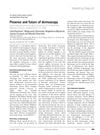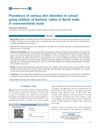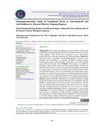 58 citations,
November 2013 in “Journal of Innovative Optical Health Sciences”
58 citations,
November 2013 in “Journal of Innovative Optical Health Sciences” Multiphoton microscopy is a promising tool for detailed skin imaging and could improve patient care if its challenges are addressed.
 55 citations,
November 2004 in “Expert opinion on drug safety”
55 citations,
November 2004 in “Expert opinion on drug safety” Chemotherapy often causes hair loss, nail changes, and mouth issues, but these are usually manageable.
 47 citations,
February 2019 in “Journal of The American Academy of Dermatology”
47 citations,
February 2019 in “Journal of The American Academy of Dermatology” LGBT individuals have unique skin health needs, including higher STD risks and side effects from gender-affirming treatments, requiring dermatologists to offer knowledgeable and culturally competent care.
[object Object]  39 citations,
October 2010 in “Journal of The American Academy of Dermatology”
39 citations,
October 2010 in “Journal of The American Academy of Dermatology” Some patients with mycosis fungoides or Sézary syndrome experience hair loss, which may be similar to alopecia areata or linked to skin lesions, possibly due to abnormal T cells, and bexarotene can help treat it.
 36 citations,
December 2015 in “Drugs”
36 citations,
December 2015 in “Drugs” New treatments for a chronic skin condition show promise, but individualized plans are crucial due to varying responses.
 32 citations,
April 2000 in “Dermatologic Clinics”
32 citations,
April 2000 in “Dermatologic Clinics” Skin diseases, especially psoriasis, greatly affect people's quality of life, similar to chronic diseases.
 27 citations,
July 2018 in “Journal of optometry”
27 citations,
July 2018 in “Journal of optometry” Eyelashes protect the eyes, but more research is needed to understand how.
 25 citations,
July 2021 in “Journal of Medical Virology”
25 citations,
July 2021 in “Journal of Medical Virology” COVID-19 can cause various skin issues, including rashes and hair loss, which usually heal on their own and don't always indicate severe illness.
 21 citations,
June 2020 in “Dermatologic Therapy”
21 citations,
June 2020 in “Dermatologic Therapy” The COVID-19 pandemic led to fewer dermatology visits and changed the types of skin conditions patients experienced.
 18 citations,
December 1996 in “Seminars in Cutaneous Medicine and Surgery”
18 citations,
December 1996 in “Seminars in Cutaneous Medicine and Surgery” Chemotherapy and cytokine therapy can cause various skin reactions, including hair loss and hypersensitivity.
 14 citations,
October 2020 in “Natural Products and Bioprospecting”
14 citations,
October 2020 in “Natural Products and Bioprospecting” Various treatments, including FDA-approved drugs, natural products, and oral supplements, can help with hair loss, but a patient's medical history and potential allergies should be considered when choosing a treatment.
 13 citations,
August 2005 in “Dermatologic Clinics”
13 citations,
August 2005 in “Dermatologic Clinics” Doctors should consider psychological factors when treating skin conditions and work with mental health experts.
 11 citations,
December 2006 in “Expert Review of Dermatology”
11 citations,
December 2006 in “Expert Review of Dermatology” Dermoscopy is becoming essential for diagnosing skin conditions and is expected to be a standard tool for dermatologists.
 10 citations,
June 2019 in “International Journal of Cosmetic Science”
10 citations,
June 2019 in “International Journal of Cosmetic Science” Some plant-based chemicals may help with hair growth, but more research is needed to confirm their effectiveness.
 8 citations,
January 2017 in “Elsevier eBooks”
8 citations,
January 2017 in “Elsevier eBooks” Certain nutrients can help keep skin healthy as we age.
 7 citations,
September 2013 in “Current Dermatology Reports”
7 citations,
September 2013 in “Current Dermatology Reports” Some skin medications are safe for pregnant women, but others pose risks or should not be used.
 6 citations,
January 2015 in “Dermatology”
6 citations,
January 2015 in “Dermatology” Trichoscopy helps diagnose hair and scalp problems but isn't always definitive and should be used with other methods.
 6 citations,
January 2013 in “Indian Journal of Paediatric Dermatology”
6 citations,
January 2013 in “Indian Journal of Paediatric Dermatology” About 69% of school children in Kashmir valley have skin disorders, with eczema and acne being the most common.
 4 citations,
January 2021 in “Skin appendage disorders”
4 citations,
January 2021 in “Skin appendage disorders” Trichodynia is a painful scalp condition not directly linked to the amount or type of hair loss and may involve psychological factors, with treatments showing mixed results.
 4 citations,
September 2014 in “Elsevier eBooks”
4 citations,
September 2014 in “Elsevier eBooks” Use some skin medications with caution during pregnancy; avoid strong steroids, certain eczema treatments, and systemic retinoids, but many topical treatments and nasal sprays are safe.
 4 citations,
January 2012 in “Elsevier eBooks”
4 citations,
January 2012 in “Elsevier eBooks” The document concludes that various skin conditions have specific treatments, ranging from antihistamines for urticaria to surgery and medication for tumors and chronic skin diseases.
 1 citations,
October 2014
1 citations,
October 2014 The document concludes that diagnosing and managing plaque psoriasis, particularly in sensitive areas, is challenging and requires careful differentiation from similar skin conditions.
 October 2023 in “Jurnal Farmasi Galenika (Galenika Journal of Pharmacy)”
October 2023 in “Jurnal Farmasi Galenika (Galenika Journal of Pharmacy)” Traditional herbs in Amarasi District may help treat dandruff and hair loss.
 September 2023 in “Research Square (Research Square)”
September 2023 in “Research Square (Research Square)” TNC+ fibroblasts play a key role in skin inflammation by interacting with T cells.
 May 2023 in “Research Square (Research Square)”
May 2023 in “Research Square (Research Square)” Shi-Bi-Man activates hair follicle stem cells and promotes hair growth by changing lactic acid metabolism and other cellular processes.
 January 2020 in “Elsevier eBooks”
January 2020 in “Elsevier eBooks” Plant-based chemicals may help hair growth and prevent hair loss but need more research to compete with current treatments.

The document concludes that non-endocrine alopecia in pets varies in treatment effectiveness and often has a poor prognosis, especially in cats.

Changes in skin bacteria can affect hair loss and new treatments targeting these bacteria may prevent balding without sexual side effects.
 October 2018 in “InTech eBooks”
October 2018 in “InTech eBooks” The most effective treatments for hair loss are minoxidil, finasteride, PRP, and hair transplants, with steroids and immunosuppressants for autoimmune types.
[object Object]  May 2017 in “InTech eBooks”
May 2017 in “InTech eBooks” Trichoscopy and trichogram are useful for diagnosing hair and scalp conditions.






























